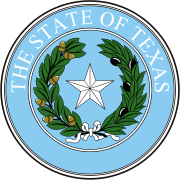| Texas House Bill 20 | |
|---|---|
 | |
| Texas Legislature | |
| |
| Territorial extent | Texas |
| Passed by | Texas Legislature |
| Passed | September 9, 2021 |
| Legislative history | |
| Bill title | Texas House Bill 20 |
| Introduced by | Bryan Hughes, Briscoe Cain |
| First reading | August 19, 2021 |
| Second reading | August 27, 2021 |
| Third reading | August 31, 2021 |
| Keywords | |
| censorship, Social media, electronic mail, common carrier | |
| Status: Pending | |
An Act Relating to censorship of or certain other interference with digital expression, including expression on social media platforms or through electronic mail messages, also known as Texas House Bill 20 (HB20), is a Texas anti-deplatforming law enacted on September 9, 2021.
It prohibits large social media platforms from removing, moderating, or labeling posts made by users in the state of Texas based on their "viewpoints", unless considered illegal under federal law or otherwise falling into exempted categories. It also requires them to make various public disclosures relating to their business practices (including the impact of algorithmic and moderation decisions on the content that is delivered to users).
The bill is part of a wider array of Republican-backed legislation seeking to prohibit the censorship of political speech,[1][2] based on allegations that the moderation policies of large social media platforms are not politically neutral.[3][4][5][6][7]
It has been challenged in NetChoice, LLC v. Paxton, and is currently the subject of a circuit split between the Fifth Circuit, and a decision by the Eleventh Circuit that struck down a similar bill in the state of Florida. In September 2023, the U.S. Supreme Court agreed to hear NetChoice v. Paxton jointly with NetChoice v. Moody on questions of whether the Florida and Texas state laws are in compliance with the 1st Amendment.[8][9]
- ^ Cite error: The named reference
:0was invoked but never defined (see the help page). - ^ Cite error: The named reference
:1was invoked but never defined (see the help page). - ^ Harmon, Elliot (April 12, 2018). "No, Section 230 Does Not Require Platforms to Be "Neutral"". Electronic Frontier Foundation. Archived from the original on February 17, 2021. Retrieved July 17, 2019.
- ^ Robertson, Adi (June 21, 2019). "Why the internet's most important law exists and how people are still getting it wrong". The Verge. Archived from the original on February 26, 2021. Retrieved July 17, 2019.
- ^ Lecher, Colin (June 20, 2019). "Both parties are mad about a proposal for federal anti-bias certification". The Verge. Archived from the original on February 24, 2021. Retrieved July 17, 2019.
- ^ Brandom, Russell (June 17, 2020). "Senate Republicans want to make it easier to sue tech companies for bias". The Verge. Archived from the original on February 20, 2021. Retrieved June 17, 2020.
- ^ Kelly, Makena (September 8, 2020). "Republicans pressure platforms with new 230 bill". The Verge. Archived from the original on February 28, 2021. Retrieved September 8, 2020.
- ^ Bravin, Jess (September 29, 2023). "Supreme Court Takes Case on Social-Media Content Moderation". The Wall Street Journal. News Corp. Retrieved September 29, 2023.
- ^ Capoot, Ashley (September 29, 2023). "Supreme Court to hear Texas and Florida social media cases over right to moderate content". CNBC. Retrieved September 29, 2023.